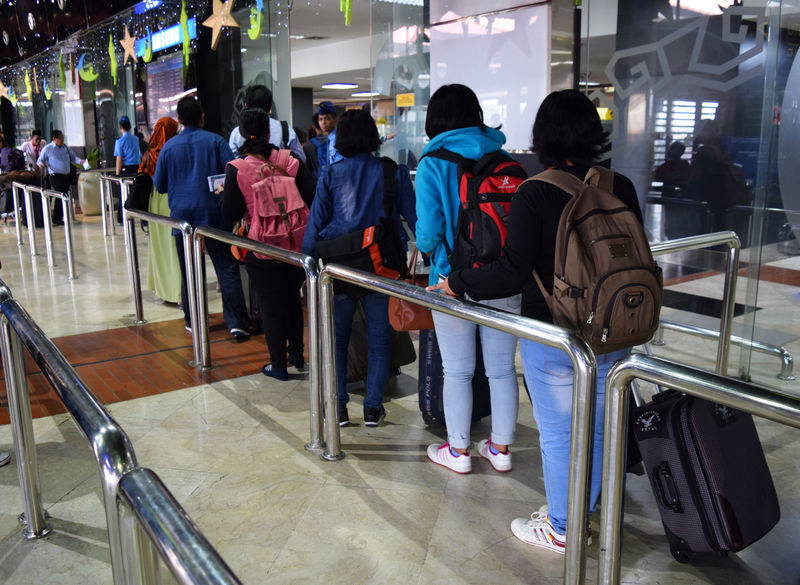By Beh Lih Yi
JAKARTA (Thomson Reuters Foundation) - Rima Jayanti has not had formal training in detective work but with her sharp eye and gut instinct, her task is to spot Indonesian women at Jakarta's bustling airport in danger of being sent abroad to a life of domestic servitude.
Making her rounds, the 23-year-old quickly points out groups of women likely heading abroad to work as maids.
"We can tell from their appearance - sometimes with a bit of instinct too - who are the potential victims and where they are going," Jayanti said.
Domestic helpers going to the Middle East tend to wear an Islamic headscarf, be middle-aged and elusive when asked about their plans, she said.
Women travelling to Hong Kong or Taiwan meanwhile usually have short hair, wear sneakers and are younger.
Some 2.3 million Indonesians are working as maids in wealthier countries in Asia and the Middle East, risking abuse including the non-payment of wages and physical assault.
Jayanti is part of a small team of "maid detectives" from Jakarta-based rights group Migrant Care, tracking down potential victims of human trafficking, and offering advice to others leaving of their own free will on how to look after themselves.
They have had some small successes since they began work last year.
They rescued a woman who had been brought to the airport by a maid agent, only to discover she was about to be sent to Saudi Arabia against her will.
Women often approach a maid agent to help them secure a placement abroad and handle the paperwork. While most work within the law, some have been accused of trafficking women.
"Some women do not know where they are going and what type of job they are getting into, making them vulnerable to human trafficking," said Migrant Care's advocacy programme manager Mike Verawati.
HIGH DEMAND FOR INDONESIAN MAIDS
Maids make up more than a third of the six million Indonesians working abroad, attracted by promises of higher salaries. Last year, migrant workers sent home some $9.4 billion in remittances, according to official data.
But stories abound of maids being sent abroad against their will, enduring horrific abuse and living in slave-like conditions.
A Hong Kong woman was convicted last year of beating her Indonesian maid, denying her food and confiscating her passport.
Jakarta last year summoned the Saudi Arabian ambassador after two Indonesian maids were executed in the Gulf state within a week, one for killing her allegedly abusive employer.
Complaints of mistreatment of Indonesians in the Middle East and the ensuing diplomatic rows prompted Jakarta announced in May 2015 to permanently ban maids from moving to the region. Maids already working there were allowed to remain.
But groups like Migrant Care and the National Advocacy Network of Domestic Workers - two of the Indonesia's leading organisations fighting for maids' rights - have criticised the ban.
They say it restricts women's rights to employment and puts them in greater danger by driving underground an industry which already has a dark side to it.
In March, Indonesian police busted a human trafficking ring which allegedly sent up to 600 Indonesians to work as domestic helpers in the Middle East, local media reported.
"I LIKE WORKING IN SAUDI"
A Migrant Care survey found 1,020 women interviewed at the airport between March 2015 and May this year were heading abroad to work as maids, with the majority going to the Middle East.
Most travelled on tourist or special pilgrimage visas, lured by promises of salaries of at least $300 a month.
Sri, who only gave her first name and has worked in Saudi Arabia in the past, said she was heading back in the hope of finding employment there again.
"I like working there - my work can support my family," the 40-year old said, wearing a white headscarf and travelling with 16 other women. She was spotted by the "maid detectives".
As Sri spoke, a maid agent lurked in the background, taking photos of her talking.
"IF MAIDS ARE CAUGHT, THEY WILL BE PUNISHED"
Officials from the foreign ministry and the government's migrants' protection agency, BNP2TKI, told the Thomson Reuters Foundation they have advised domestic helpers against travelling illegally.
"Maybe one or two are leaving illegally. If they are caught, they will be punished under anti-trafficking laws," Agusdin Subiantoro, who deals with maids working abroad as deputy placement head at the BNP2TKI, said last week.
Some researchers have questioned the wisdom of the ban, noting that the government has not offered domestic helpers - often the main earner in a family - an alternative.
"The moratorium has significantly affected women's opportunity to gain income for their family," said researcher Rofi Uddarojat from Jakarta-based think-tank the Center for Indonesian Policies Studies.
For now, the Migrant Care team is helping women in any way they can.

"We try to raise their awareness before they leave, we ask them if they have a clear contract, if they know who their employers are," Verawati said.